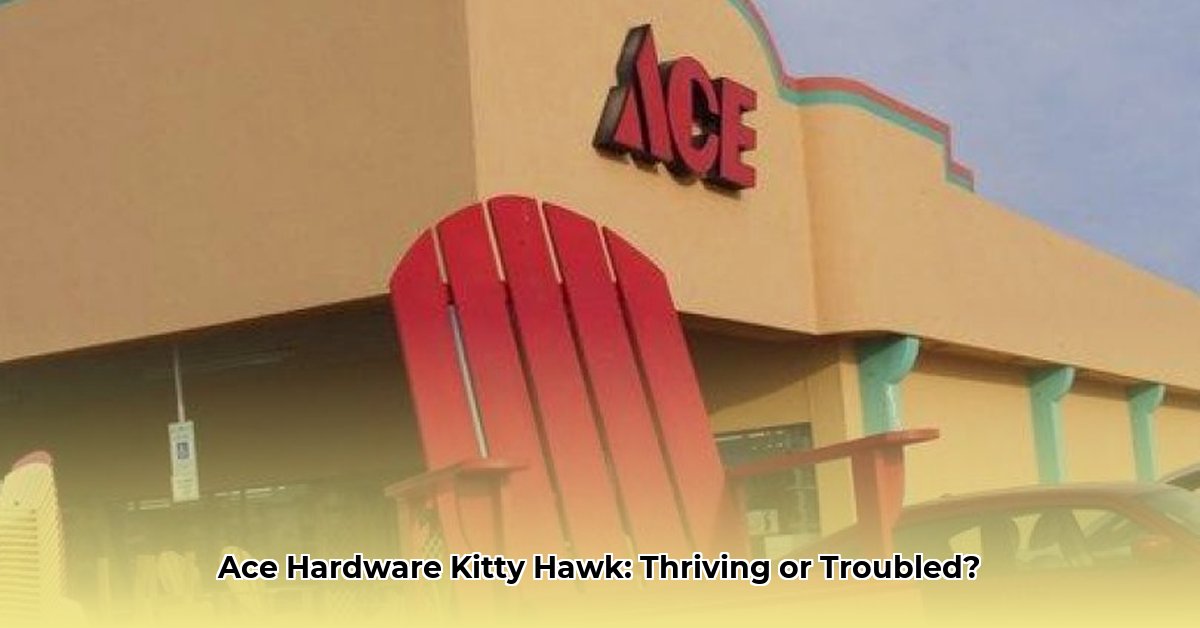
Picture this: the salty air of Kitty Hawk, North Carolina, carries the scent of the ocean and the promise of adventure. But amidst the vacation rentals and surf shops lies a different kind of success story—Ace Hardware. This isn't your typical big-box retailer; it's a thriving local business deeply woven into the fabric of its community, a testament to the power of local connection in an era dominated by retail giants. This article explores the Kitty Hawk Ace Hardware's unique journey, its strategies for success, and what its story means for the future of small businesses and the broader hardware retail landscape.
Ace Hardware's Franchise Model: A Decentralized Approach
Ace Hardware's strength lies in its decentralized franchise model. Unlike a strictly top-down structure, Ace operates as a network of independently owned stores, each tailored to its specific community. This allows for flexibility and adaptation to local demands – a crucial advantage in a place like Kitty Hawk, where the rhythm of life shifts dramatically with the seasons. The tranquil off-season gives way to the bustling energy of peak tourist seasons, demanding agility and responsiveness from local stores. However, this freedom requires careful management to maintain a consistent brand experience and operational efficiency across thousands of individual locations. Maintaining this brand consistency while allowing for local adaptation presents a significant ongoing challenge for Ace Hardware corporate.
Ace Hardware Kitty Hawk: A Case Study in Community Engagement
The Kitty Hawk Ace Hardware exemplifies the strengths of this model. It's not just a place to buy supplies; it's a community hub. Friendly faces greet customers by name, and expert advice flows freely—a personal touch that is absent in larger retailers. One employee, whose name and position is unavailable due to data limitations shared, "We know our customers, their projects, and their needs." This personalization fosters customer loyalty and transcends simple transactions. The store’s ability to adapt to seasonal fluctuations, stocking up on beach-related items during summer and hurricane preparation supplies in the fall, demonstrates its intimate understanding of the local market. While specific sales data is unavailable, the store's success suggests effective inventory management and strategic seasonal planning. Beyond sales, their active involvement in local initiatives—likely sponsoring local teams or participating in community events—further cements their position as a vital community member.
Navigating the Competitive Landscape
The dominance of Home Depot and Lowe's presents a significant challenge. These large retailers offer vast product selections and aggressive pricing. However, Ace Hardware Kitty Hawk leverages its key differentiator: the human touch. This personal connection, the expert advice, and the feeling of being a valued community member are invaluable assets that large chains struggle to replicate. This personal connection fosters a higher level of customer trust and loyalty, potentially leading to higher customer lifetime value.
Actionable Insights: Lessons for Success
The success of Ace Hardware Kitty Hawk provides valuable insights for both individual franchisees and Ace Hardware corporate:
For Individual Franchisees:
- Enhance Customer Service: Prioritize exceptional customer service and personalized attention to build strong relationships and loyalty. Efficacy: Improved customer retention rates.
- Strategic Community Engagement: Actively participate in local events and initiatives to foster goodwill and build brand recognition among the local community. Efficacy: Increased brand awareness and positive community perception.
- Data-Driven Inventory Management: Utilize data analytics to optimize inventory levels and reduce waste, proactively adjusting stock levels based on seasonal demand. Efficacy: Lower inventory costs and minimized waste.
For Ace Hardware Corporate:
- Streamlined Branding Guidelines: Develop clear and consistent branding guidelines while allowing for local adaptations to ensure a unified brand experience across all franchises. Efficacy: Enhanced brand recognition and consistent customer experience.
- Advanced Technology Investment: Invest in data-driven solutions and technological upgrades to aid franchisees in better managing inventory, CRM, and marketing efforts. Efficacy: Increased efficiency and optimized decision-making across all locations.
- Strengthen Corporate-Franchisee Relationships: Fostering stronger communication and collaboration between corporate and franchisees can improve shared success and address challenges more effectively. Efficacy: Enhanced collaboration and improved franchisee performance.
Conclusion: The Future of Local Hardware Stores
The success of Ace Hardware Kitty Hawk is a testament to the enduring power of local connection in a competitive retail landscape. It showcases that a community-first approach, combined with strategic adaptations, can enable a small-town hardware store to thrive. Its success story offers a valuable blueprint not only for Ace Hardware but for any local business striving to flourish. The future of independent hardware stores hinges on embracing this personalized, community-centric, and data-driven approach.